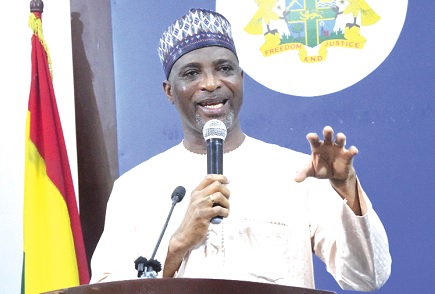
2020/2024 Elections violence: 21 Culprits face trial - 15 Deaths, 39 injuries recorded
Police investigations have found 21 individuals culpable for elections-related violence in 2020 and 2024, which together claimed 15 lives and injured 40 others.
Three of the suspects are standing trial, four others are on police enquiry bail, while five more are on remand in prison.
Separate warrants have been issued for the arrest of the remaining suspects in the first comprehensive effort to deal with election-related violence in the country.
The Minister for the Interior, Muntaka Mohammed-Mubarak, announcing this at a news conference in Accra yesterday, said he had instructed that the report of the commission on the election violence at Ayawaso West Wuogon be implemented fully for justice to prevail.
The investigations by a special task force were conducted under the auspices of the Inspector-General of Police following an instruction by President John Dramani Mahama to that effect in January this year.
The Special Investigation Task Force within the Criminal Investigations Department (CID) of the Ghana Police Service was inaugurated by the then Inspector-General of Police, Dr George Akuffo Dampare, on January 16, 2025, to collaborate with relevant stakeholders to identify, review and investigate all electoral violence cases that resulted in fatalities in the last two presidential and parliamentary elections.
Causes
The report, according to the minister, traced the deaths and injuries to multiple causes, including conflicts among political actors on opposite sides and poor security personnel actions in managing violence.

Some journalists at the press conference
“The investigation established that three of the cases resulting in four deaths are traceable to the use of a firearm by armed police patrol teams. Military personnel were also found to be responsible for three of the cases resulting in the death of three persons when they intervened to restore calm to chaotic crowds,” the minister said.
“The investigation further established that four of the cases, which resulted in five deaths, were recorded when party enthusiasts resorted to the use of a firearm against their opponents.
The two other cases involved persons who were lynched during confrontations between supporters of the two major parties,” Mr Mohammed-Mubarak added.
He said the crowd control response of security personnel — resorting to the firing of live ammunition and also directing fire at the escaping crowd — “is not acceptable”.
Report
The report indicated that there were two deaths with nine injured in Techiman South and one death in Nkoranza South, both in the Bono East Region.
There were two deaths and 15 injured in Odododiodoo and one death and four injured in Ablekuma Central, both in the Greater Accra Region; one death with two injured in Banda, and one death with another injured in Dormaa West, both in the Bono Region.
In Savelugu in the Northern Region, there was one death and three injured persons; one death with one injured in Awutu Senya East in the Central Region; one death in Damongo in the Savannah Region; one death in Tolon in the Northern Region; two deaths with two injured in Offinso North, and one death with three injured in Ahafo Ano South West, both in the Ashanti Region.
Recommendations
The task force recommended compensation and other necessary restitution measures to bring to a conclusion some of the most controversial cases of election-related violence in the Fourth Republic.
Mr Mohammed-Mubarak said the report identified cumulatively 12 cases which led to the fatalities in the two elections.
“Six each from the 2020 and the 2024 general elections, which collectively led to fifteen deaths and injured 40 others.
These incidents span multiple regions, including Bono East, Greater Accra, Bono, Northern, Central, Savannah and Ashanti,” he said.
The Interior Minister indicated that the circumstances of each case were varied, but nearly all involved the use of firearms during confrontations between supporters of the two major political parties and instances where security personnel resorted to the use of live ammunition, "warning shots" as a means of crowd control.
As part of the recommendations, the minister said families of victims of the electoral violence cases would be compensated by the state following the conclusion of the investigations.
The report recommended that the police should also be given orientation and desist from using lethal force in crowd control situations, while the security services should also be provided with crowd control gear.
The minister said party executives, officials and persons involved in election management should be well educated on the provisions of the Anti-Vigilantism Act, 2019 (Act 999).
Meanwhile, the docket of the cases has been referred to the Cold Case Unit of the CID for further action.
